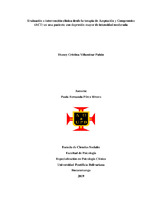Evaluación e intervención clínica desde la terapia de Aceptación y Compromiso (ACT) en una paciente con depresión mayor de intensidad moderada

View/
Date
2019-05xmlui.dri2xhtml.METS-1.0.item-advisor
Pérez Rivero, Paula Fernanda
xmlui.dri2xhtml.METS-1.0.item-type
Especialización
Citación
Metadata
Show full item recordDocuments PDF
Abstract
En el presente estudio de caso se da a conocer el proceso de evaluación e intervención psicoterapéutica para un trastorno depresivo mayor de intensidad moderada; llevado a cabo durante 13 sesiones, basado en la Terapia de Aceptación y Compromiso (ACT). Se utilizó un diseño de caso único que estuvo compuesto por dos fases AB con seguimiento. Para la selección de la participante se tuvo en cuenta el número de sesiones a las que asistió a consulta. En cuanto al proceso clínico de evaluación y diagnóstico se utilizó la entrevista clínica no estructurada y se aplicó el Inventario de Depresión de Beck- II (IDB-11). Sumado a esto, se hizo uso de algunos instrumentos propios de ACT como lo son el Cuestionario de Aceptación Acción (AAQ-I1), el cuestionario de valores, el formulario narrativo de valores y el formulario de objetivo, acciones y barreras. Además, se empleó un auto registro elaborado por el terapeuta. El desarrollo de este estudio de caso se dio por medio de dos fases: evaluación e intervención y se llevó a cabo seguimiento. Los resultados mostraron una disminución de los síntomas depresivos, mayor aceptación de los eventos privados y por ende menor evitación experiencial. Igualmente, se evidenció un incremento de conductas dirigidas a diversas áreas valiosas que a su vez generaron una mayor activación conductual. A partir de lo anterior, se constata una alta efectividad de la ACT, la cual da lugar a que el paciente identifique la evitación vivencial como resultado de la rigidez psicológica. Al mismo tiempo, es más consiente de los límites del lenguaje y cómo algunas veces el contenido verbal puede conducir al sufrimiento. In the present case study, the process of evaluation and psychotherapeutic intervention for a major depressive disorder of moderate intensity is reported; carried out during 13 sessions, based on Acceptance and Commitment Therapy (ACT). A unique case design was used that consisted of two AB phases with follow-up. For the selection of the participant, the number of sessions attended was taken into account. Regarding the clinical process of evaluation and diagnosis, the unstructured clinical interview was used and the Beck-II Depression Inventory (IDB-II) was applied. Added to this, some ACT instruments were used, such as the Acceptance Action Questionnaire (AAQ-II), the securities questionnaire, the narrative form of values and the objective form, actions and barriers. In addition, a self-report prepared by the therapist was used. The development of this case study was carried out through two phases: evaluation and intervention and follow-up was carried out. The results showed a decrease in depressive symptoms, greater acceptance of private events and therefore less experiential avoidance. Likewise, there was an increase in behaviors aimed at various valuable areas that in turn generated greater behavioral activation. Based on the above, there is a high effectiveness of ACT, which results in the patient identifying experiential avoidance as a result of psychological rigidity. At the same time, he is more aware of the limits of language and how sometimes verbal content can lead to suffering.
Keyword/s
Intervención psicológica
Terapia de aceptación
Depresión mental
Compromiso (Psicología)
Psicodiagnóstico
Collections
- Trabajos de grado [6440]
The following license files are associated with this item:

